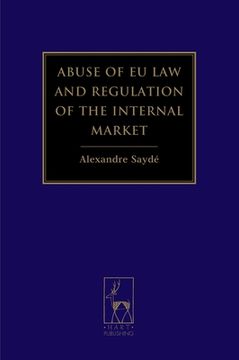Share
Abuse of Eu Law and Regulation of the Internal Market
Alexandre Sayde
(Author)
·
Bloomsbury Publishing PLC
· Hardcover
Abuse of Eu Law and Regulation of the Internal Market - Sayde, Alexandre
Choose the list to add your product or create one New List
✓ Product added successfully to the Wishlist.
Go to My Wishlists
Origin: U.S.A.
(Import costs included in the price)
It will be shipped from our warehouse between
Tuesday, July 16 and
Tuesday, July 23.
You will receive it anywhere in United Kingdom between 1 and 3 business days after shipment.
Synopsis "Abuse of Eu Law and Regulation of the Internal Market"
How can the concept of abuse of EU law - which can be defined as undesirable choice of law made by a private citizen - generate so much disagreement among equally intelligent individuals? Seeking to transcend the classical debate between its supporters and adversaries, this present study submits that the concept of abuse of EU law is located on three major fault-lines of EU law, which accounts for the well-established controversies in the field. The first fault-line, which is common to all legal orders, opposes legal congruence (the tendency to yield equitable legal outcomes) to legal certainty (the tendency to yield predictable legal outcomes). Partisans of legal congruence tend to endorse the concept of abuse of law, whereas partisans of legal certainty tend to reject it. The second fault-line is specific to EU law and divides two conceptions of the regulation of the internal market. If economic integration is conceived as the promotion of cross-border competition among private businesses (the paradigm of 'regulatory neutrality'), choices of law must be sanctioned as abusive, for they distort business competition. But, if economic integration is intended to promote competition among Member States (the paradigm of 'regulatory competition'), choices of law by EU citizens represent a desirable process of arbitrage among national laws. The third and final fault-line corresponds to the tension between two orientations of the economic constitution of the EU, namely the fear of private power and the fear of public power. Those who fear private power most tend to endorse the concept of abuse of law, whereas those who fear public power most tend to reject it. The thesis that the book was based on won the European Law Faculties Association Award for Outstanding Doctoral Thesis. It offers a way in which questions about the nature and function of EU law can be confronted and examined in a new light. It is a fresh and fascinating study that will be of interest to all scholars of European law and international trade law.
- 0% (0)
- 0% (0)
- 0% (0)
- 0% (0)
- 0% (0)
All books in our catalog are Original.
The book is written in English.
The binding of this edition is Hardcover.
✓ Producto agregado correctamente al carro, Ir a Pagar.

